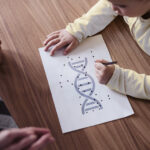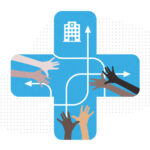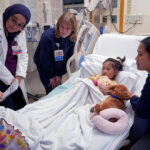Medical care for youth with neurodevelopmental disabilities: A call for change

According to national data, one in six children has a neurodevelopmental disability (NDD) such as autism, intellectual disability, or ADHD. Their medical care is often inadequate, sometimes leaving conditions untreated and neglecting preventive care — with poorer outcomes as the result.
Clinicians may not take time to communicate with children, teens, and young adults with NDDs. Instead, these patients are more likely to experience seclusion, restraints, accidents, and injuries during their care, causing physical and emotional harm. Some examples from testimony recently provided by patients, families, and caregivers around the country:
- A young man with aggressive behaviors is confined to a hospital room for months awaiting placement, with food used as an incentive to stay in his room. Because of this, his antipsychotic medication, and no opportunities to exercise, he gains 30 pounds.
- A terrified child with autism is held down by several people in the emergency room so he can receive a sedative medication.
- The family of a boy with autism is told he won’t need home care after his orthopedic surgery. Back at home, his mother finds that he has ripped off his casts. The emergency room provides little follow-up instruction, and insurance won’t pay for home care services.
Alarmed by this state of affairs, Carol Weitzman, MD, co-director of the Autism Spectrum Center at Boston Children’s Hospital, led the development of Supporting Access for Everyone (SAFE) — a first-of-its-kind consensus statement calling for system-wide change. Compiled by a diverse group of healthcare experts from around the country, it was published April 10 in the journal Pediatrics.
“Everyone has a right to equitable and compassionate care,” Weitzman asserts. “Patients are too often asked to ‘check your disabilities at the door and do things our way.’ But systems need to be willing to change.”
Taking testimony
The SAFE team began with a two-day fact-finding conference. Forty people presented testimony: parents and caregivers, adults with NDDs sharing their lived experience, professionals in developmental-behavioral pediatrics, psychology, behavioral health, psychiatry, neurology, occupational therapy, and child life, and program administrators.
“It was eye-opening to listen to people and hear about the medical trauma they experienced or witnessed,” says Weitzman.
Our work establishes what we as a nation need to do.
Building disability awareness into medicine
Drawing on this testimony, the SAFE panel developed a series of consensus statements outlining what hospitals need to do to transform care. They call for change across five domains:
- Training for providers about NDDs and patients’ special care needs, tailored to various professional roles. “It shouldn’t be a one-off ‘I got trained’ type of effort, but deeper, ongoing, and more comprehensive,” Weitzman says. “A health system has to commit to training and invest in it. All patient-facing staff need to learn the basics.”
- Communication with patients and families should be proactive and consider the communications needs of children who do not speak and may use alternative forms of communication. “Providers should explain, ‘You’re going to need a longer visit,’ or ‘We’re going to incorporate your communication device.’”
- Access and planning: Teams should develop support plans in advance of a healthcare encounter together with patients and families. Plans should take proactive steps to put patients at ease, provide access to needed expertise and accommodations, and include provisions for transitioning to adult care.
- Diversity, equity, inclusion, belonging, and anti-ableism. Structural ableism tends to devalue and disadvantage people with disabilities. Marginalized racial, ethnic, gender, and other identities can compound health inequities. Providers may make assumptions about them or feel that having a disability means they can’t have a good quality of life.
- Policy and structural change must occur throughout the entire health system with collaboration across departments, continuous quality improvement, measurement of patient satisfaction, and accreditation requirements. Health systems should advocate for changes in reimbursement and payment models to keep patients with NDDs healthier long-term.
First do no harm
SAFE’s consensus statements fill a yawning gap in the medical system. “There is very little research in the literature on how to provide effective accommodations for disabilities in healthcare settings,” says Weitzman. “Our work establishes what we as a nation need to do.”
In Massachusetts, bills now in front of the legislature also seek to fill the gap: S. 1401 and H. 172, both titled “An Act to Enhance Hospital Care for those with Autism and Intellectual and Developmental Disabilities.” Measures would include training and continuing education requirements for providers across multiple professions.
An NDD Bill of Rights
SAFE care is:
– Care that individuals understand and want
– Individualized care that evolves with people’s changing needs
– Accessible throughout the entire lifespan
– Equitable and respectful
– Defined and measured by patient experience, quality of care, and psychological well-being of patients and caregivers.
‘You need to be human’
The SAFE testimony shows that it’s possible to do better, offering some positive examples of NDD-informed care.
Theresa McCarthy, a child life specialist at Boston Children’s, talked about a child waiting for an X-ray who became agitated, began pacing the room, and landed on the floor, crying loudly. McCarthy met him where he was: sitting beside him on the floor, she chatted with him and introduced an activity on an iPad. The child calmed, agreed to take a seat, and was fine for the rest of the visit.
A mother related another positive experience: Her son was soon to have GI surgery, a source of great anxiety. The surgical team learned that his favorite song was “We Are the Champions.” The team got together and sang it with him all the way to the operating room. “You don’t need a degree in developmental disabilities,” his mother says. “You need to be human.”
Learn more about the Division of Developmental Medicine at Boston Children’s.
Related Posts :
-

Could ADHD be diagnosed genetically?
Despite it being very common, ADHD is often missed until a child reaches age 7 or older. By that time, they ...
-

Revisiting race and ethnicity in clinical guidelines
Health care institutions often rely on clinical pathways in assessing patients and making decisions about their care. Some of these ...
-

Helping clinicians embrace family-centered rounds
If you’ve ever been hospitalized, you may have experienced this: groups of doctors coming in and talking about you ...
-

Toddlers diagnosed with autism should be reevaluated over time
Parents whose child has been diagnosed with autism spectrum disorder (ASD) may feel it’s a lifelong label. But a ...





